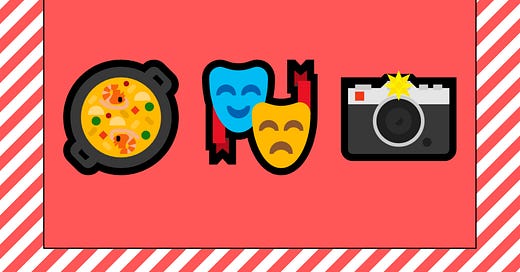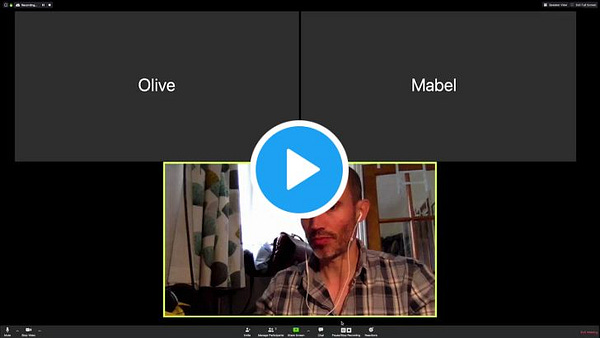Amid the noise of picture-perfect Barbies
Oh no, not another Alison Roman take, you say
but she has been the TALK of my two-person household for a good 60 percent of the past week’s waking hours. First I had to explain to the bemused, oblivious other half of the household who she is and, more importantly, What She Represents.
That done, I then found myself stewing (… heh get it, stewing) in my own ambivalence about the style of digital self-presentation that brought Roman to prominence. Because you can say all you want about The Stew, The Shallot Pasta, the whatever: Roman rose above the other recipe-writers of the world — ascended to the vaulted post of lifestyle influencer — because she seems “relatable” and “authentic” on Instagram. That is her real power.
Here’s Vanity Fair: “Roman has an uncanny way of delivering what the people want … which has as much to do with her brightly seasoned recipes as with her disarming candor.”
Elle: “Her own feed is a careful, but never careful-seeming, seamless blend of personal and professional—which often merge for her anyway. … What sets Roman apart is that the food looks both delicious and achievable. The vibe is less showoffy than genuinely shareable.”
Vox: “Roman doesn’t cook to entertain or impress others, or as a rare special occasion. Her recipes are made to be simple, to be delicious, and even to be eaten alone … Roman is the realist inverse of [Ina] Garten.”
Even Roman herself, in that now very infamous interview: “I run my own social media, my own Instagram. I run my own Twitter. The idea that I would ever not do that — and that I would somehow lend my brand to someone else who’s going to approximate me — horrifies me. I’d rather stay small and always be myself.”
… you get the idea! Alison Roman, “cool girl” of food, etc. etc.
What makes this all so precarious, though — and what I think always set her up for some kind of comeuppance, though perhaps not one this spectacular — is that “authenticity” and “reliability,” certainly among influencers, are always elaborately constructed performances.
No one rolls out of bed with a “brand” and a tone and a plate of perfectly lit food just naturally primed for consumption by a massive, diffuse audience. Instead, people like Roman expend a lot of time and energy (what the digital anthropologist Dr. Crystal Abidin calls “tacit labor”) in making her food, and her lifestyle, seem both very enviable and completely effortless.
Spend some time with her Instagram, for instance. She comments derisively on her chipped nail polish, though she’s the one who chose to photograph it (… beside a plate of perfect food). She claims to be eating pasta and G&Ts for every meal (which: crazy, if true!). Here’s Abidin, writing about the “authenticity” phenomenon in 2018:
“By the early 2010s, microcelebrity culture had flourished into a full-fledged influencer industry, where young people on Instagram especially armed themselves with luxury items to convey success and in-group status while attempting to appear effortless and intimate to followers. But with their rise, influencers’ practice and persona have become both overfamiliar and more unattainable — requiring more money, connections, inside knowledge. And given the hypersaturation of the influencer industry today, where even entry-level aspirants must prime themselves to debut as extremely professional and polished, the pretty, pristine, and picturesque have started to become boring …
To differentiate themselves from the mass market, some influencers, whether through reactionary instinct or intentional strategy, have begun to break away from the “picture perfect” mold of Instagram and return to the early lifestyle-blogging claims of a more “authentic” version of themselves, the influencer industry, and everyday life. Amid the noise of picture-perfect Barbies, they believe that what followers now want is to see ‘real life,’ unfiltered, unmediated, and uncurated. And to restore this illusion of accessibility, influencers use the notion of authenticity as a springboard to rebrand themselves as ‘more real’ than the others.”
(Bolding mine — but sounds familiar, no?)
This isn’t really a critique of Alison Roman, to be clear. (Though if you want one of those, this one is important.) She didn’t make the IG rules, she just lives under them. And I suspect many of us are out there trying to look as effortless and authentic as we possibly can, perhaps without thinking about it — in a real mind fuck, I’m now continuously asking myself to what degree I’m performing realness for you, my reader, even as I write this.
But: Maybe, just maybe, it’s worth re-examining the primacy of “realness” or “authenticity” as some great cultural virtue. Certainly the argument can now be made that it’s not a stellar metric by which to crown our food influencers.
Personally, even as an Instagram-using millennial, I prefer Melissa Clark in the pantheon of NYT food writers. And if you made it this far, you deserve one of her cakes: this one’s really good!!
Links you can use
A good, if winsome, workday soundtrack: this album of ambient New York City noises from the New York Public Library.
Something ~cultural~ to stream this weekend: this Twitter-approved taping from last year’s Shakespeare in the Park, ft. Danielle Brooks as Beatrice.
Lots of academic presses have made their books & journals free: I know we have some fellow nerds on this list.
In case you’re still bored: Here’s a very fun & thorough guide to internet distractions. (Thanks to longtime friend-of-the-links Justin!)
If you read anything this weekend
The Atlantic’s extraordinary, alarming takeout on our conspiracist era. Full disclosure: I have not read the full package — it is pretty long!! — but that’s definitely what I plan to do with my rainy weekend. Maybe start with Adrienne LaFrance on QAnon as a new American religion.
“Few people are truly evil, most are just too far disconnected from the effects of their actions.” Both a riveting profile of the hacker “who saved the internet” and a study of the price of redemption. [Wired]
(Re)breaking the last glass ceiling in games. Female protagonists are still rare in first-person shooters — but there was one brief, fascinating window when that wasn’t the case. [Ringer]
Online shaming, always a thing, is really having a moment now. On the ethics and aesthetics of social-distancing scolds, who don’t know what’s best either. [NYT]
~Bonus:~ In light of Facebook’s landmark acknowledgement that many of its moderators developed PTSD, worth revisiting this deep dive into their working conditions from 2019.
Postscripts
Ordering KFC in Gaza. Online-dating at 55. How Google “mistook” a journalist for a famous billionaire and how convincing sonnets get written by AI. The urbanist lessons of Final Fantasy 7. The rise (and fall!) of HQ Trivia. These are influencers that the quarantine made … and this is the man who made “Plandemic” influential.
Meet the new memers and conspiracists of TikTok. Brace yourself for the coming covid vaccine info-war. The problem with jumping on the “OnlyFans bandwagon” and the secret to looking good on Zoom calls. This week, in the Venn diagram of the internet & fashion: can Amazon save the industry? And what’s up with FaceTime shoots? Last but not least: If the world’s last remaining Blockbuster can survive the pandemic, surely we can too.
Thanks again for subscribing to Links. Sincerely: I appreciate it!! This takes me rather a long time to put together each week, so if you liked this edition please consider H/Ting or forwarding to a friend.
You can also send tips, submissions and hedgehog GIFs by hitting “reply.” Stay safe and sane out there!!
— Caitlin







